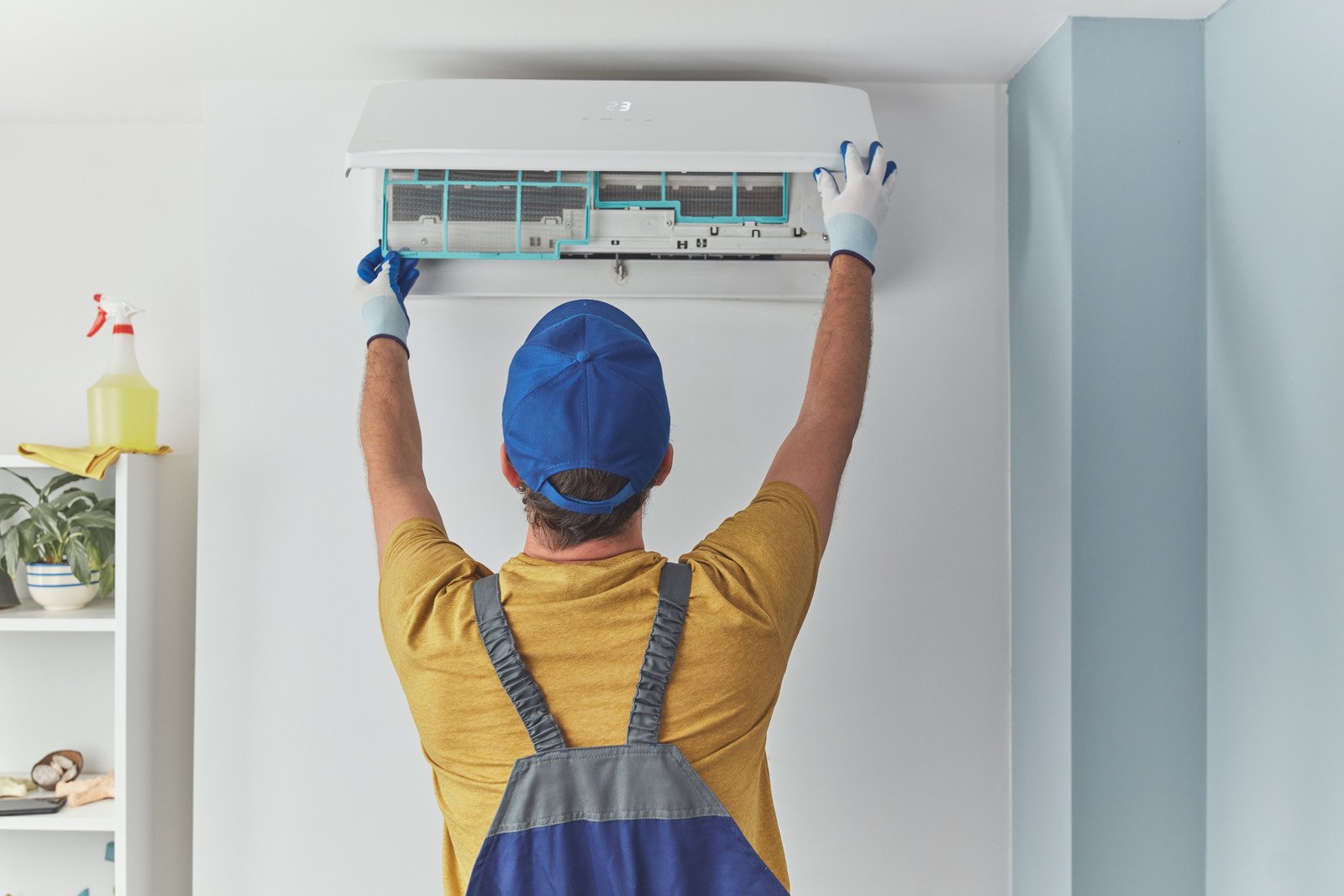When deciding between AC repair and replacement, a few important factors should guide your choice. Your unit’s age, the frequency of breakdowns, and its energy efficiency play a big role. Rising energy bills or constant malfunctions may signal it’s time to think about replacement. On the other hand, minor repairs can often solve the problem and extend your unit’s life. Understanding these details helps you make the right decision for both your comfort and your budget. So, what should you consider most?

Key Takeaways
- AC units over 10–15 years old are often more cost-effective to replace than repair.
- Frequent breakdowns and rising energy bills are strong indicators of inefficiency and may point to replacement.
- If repair costs approach 50% of a new system’s price, replacement is usually the smarter option.
- Newer models offer better energy efficiency, which means lower utility bills and long-term savings.
- A professional assessment can give you an accurate picture of your system’s condition and the costs involved.
Understanding the Lifespan of Your AC Unit
Knowing the lifespan of your AC system is key when weighing repair versus replacement.
Most AC units last about 10 to 15 years, depending on maintenance and usage. Regular care—like annual inspections, filter changes, and maintaining refrigerant levels—can help your unit run more efficiently and last longer.
Neglecting maintenance often leads to early wear and expensive repairs. Older units also tend to struggle to keep your home comfortable, which may push you toward replacement.
Understanding your unit’s expected lifespan allows you to make informed decisions about whether to invest in upkeep or start planning for a new system.
Signs Your AC Needs Repair
Sometimes, your AC will give you clear warnings that it needs attention.
If you notice strange noises, unusual odors, or uneven cooling, these are signs repairs may be necessary. Addressing problems quickly can prevent further damage and keep your unit running smoothly.
Unusual Noises and Smells
Odd sounds or smells from your AC shouldn’t be ignored.
Grinding, rattling, or hissing noises may point to loose parts, damaged components, or even a refrigerant leak. Left unchecked, these issues can turn into costly repairs.
Unpleasant odors can also signal trouble. A musty smell may indicate mold in the ductwork, while a burning odor could mean electrical problems. Both require immediate professional attention to avoid health risks and safety hazards.
Inconsistent Temperature Control
Uneven cooling is another warning sign.
If some rooms feel too warm while others are too cold, your system may be struggling. This could be due to a faulty thermostat or deeper issues within the unit.
When adjusting your thermostat doesn’t fix the problem, it’s time to call in a professional. Fixing temperature inconsistencies early can help you avoid bigger problems down the road.
When to Consider AC Replacement
There comes a point where replacing your AC makes more sense than repairing it.
If your unit is over 10–15 years old, breaks down often, or your energy bills keep rising, replacement may be the better choice.
Another guideline: if the repair costs are close to 50% of the price of a new system, it’s usually smarter to replace it.
Newer AC models are far more energy efficient, meaning lower monthly bills and better overall performance.
Cost Analysis: Repair vs. Replacement
Looking at the cost difference between repair and replacement helps you make a practical decision.
Repairs are usually cheaper upfront, but ongoing breakdowns and maintenance add up. A new unit is a bigger initial expense but often provides more reliability and efficiency.
Also, consider warranties—new systems often include coverage that can save you money in the long run. Timing can also matter, as seasonal demand may affect pricing.
Weigh both the immediate costs and the long-term savings before deciding.
Energy Efficiency and Its Impact
Energy efficiency directly affects how much your AC costs to run—and how much it impacts the environment.
Choosing a more efficient system reduces your utility bills and lowers your carbon footprint. While the upfront cost may be higher, the long-term savings often outweigh it.
Cost of Operation
An inefficient unit works harder to cool your home, driving up your monthly utility bills. Older systems also tend to need more frequent repairs, which further increases costs.
Upgrading to an energy-efficient system lowers both energy usage and maintenance needs, making it a more cost-effective choice in the long run.
Environmental Impact
Your AC’s energy efficiency also affects the environment.
Older units often use refrigerants that are harmful to the ozone layer, while newer systems use eco-friendlier alternatives. By upgrading, you help reduce greenhouse gas emissions and support more sustainable living.
Long-Term Savings
While a new AC system is a significant investment, the savings over time can be substantial.
Modern units consume far less energy and often come with smart features like programmable thermostats that further cut costs. Over the years, these savings add up, making replacement a wise financial decision.
The Importance of Professional Assessments
When deciding between repair and replacement, a professional assessment is invaluable.
Technicians can spot issues you might miss, evaluate your system’s efficiency, and give you clear insight into the costs involved. This helps you avoid unnecessary expenses and make a well-informed decision.
Long-Term Benefits of Replacement
Replacing your AC brings lasting advantages beyond just cooling.
Modern systems are more energy efficient, require fewer repairs, and often improve indoor air quality through better filtration and humidity control. These benefits enhance comfort and may even improve your health.
A new unit also gives you peace of mind, knowing you won’t face frequent breakdowns or rising utility bills.
Making the Final Decision: Key Considerations
When weighing repair versus replacement, keep these points in mind:
- Budget: Frequent repairs may add up to more than the cost of a new system.
- Age and efficiency: An older, less efficient unit is often not worth repairing.
- Maintenance: Even well-maintained systems lose efficiency over time.
- Long-term plans: If you plan to stay in your home for years, replacement may provide more comfort and savings.
Looking at these factors will help you make the best decision for your situation.
Frequently Asked Questions
Can I Repair My AC Unit Myself to Save Money?
DIY repairs might save money upfront, but if you don’t have the right tools or knowledge, you risk causing more damage and higher costs later.
What Are the Environmental Impacts of AC Replacement?
Replacing an old AC with an energy-efficient model reduces energy waste and refrigerant emissions. This helps protect the environment and improves air quality.
How Often Should I Schedule Maintenance for My AC Unit?
Schedule maintenance at least twice a year. Regular upkeep improves efficiency, prevents breakdowns, and extends your system’s lifespan.
Will a New AC Unit Increase My Home Value?
Yes. A modern, efficient AC system can make your home more attractive to buyers by lowering utility costs and improving comfort.
Are There Warranties for Both Repairs and Replacements?
Yes. Repairs and new systems often come with warranties for parts and labor. Always check the details to know exactly what’s covered.
Conclusion
In the end, choosing between AC repair and replacement comes down to age, repair history, and efficiency. If your system is older and breaks down often, replacement is usually the smarter choice for long-term comfort and savings. For smaller issues, repair may still make sense.
The best approach is to get a professional assessment so you can make a confident decision that fits your needs and budget.

